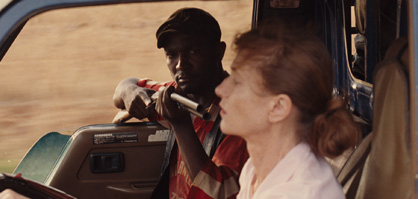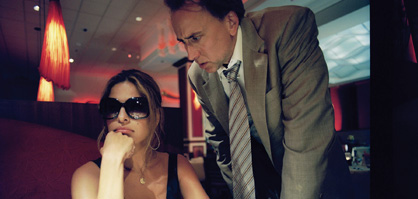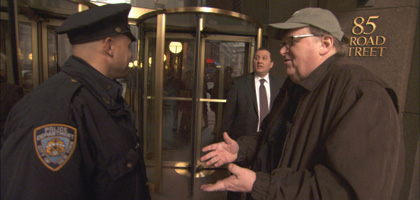Festival report
Shoot him again

White Material
Returning to Toronto with trepidation, Nick James enjoys Claire Denis' latest and a Cage-Herzog pairing
Three years ago I visited the Toronto International Film Festival for the first time as a member of the Canadian feature film jury, a very enjoyable privilege which perversely led me to delay my return. Perhaps contrarily, I felt that being there as an ordinary jobbing critic instead of a pampered guest might be disappointingly unglamorous, while owing something to the festival for its generosity might soften any criticism on my part. Perhaps these impulses might have balanced each other out, but the passing of time has at least provided some perspective. After my return to Toronto this year, the festival now strikes me as a behemoth, but one with the best intentions. It's at once an event that wears its corporate sponsorship on its sleeve – in the form of the many pre-film trailers that soon become tedious – and an intensely organised pluralist experience of high quality that nonetheless leaves you feeling like you've missed out on some of its important moments. There are too many films here, and too many of them get only one press and industry screening. Even with my regular diet of four films a day, I couldn't begin to keep up.
Fortunately most of the important titles were shared with Venice, from where Jonathan Romney has already filed two online dispatches, and tallies his thoughts in our November issue. And that also gives us the fun of contrasting views. For instance, in Toronto the receptions given to John Hillcoat's The Road and to the Israeli film Lebanon were less enthusiastic than on the Lido: I found the former too burdened with lachrymose sentiment and the latter too implausible. Meanwhile, Luca Guadagnino's fresh and exquisite I Am Love (Io sono l'amore) was one of the most talked-about films.
Claire Denis' White Material (pictured above) is on another level yet, a portrait of one white woman's struggle to keep her African coffee plantation going in the midst of a violent revolt by child soldiers under their charismatic leader 'The Boxer'. This awesome marshalling of the resources of cinema begins with a French soldier in a helicopter bellowing a warning to Maria (Isabelle Huppert) to clear out, but as the red dust whirls around her she is determined not to budge. Meanwhile, her ex-husband (Christophe Lambert, proving for once that he can act) is plotting to destabilise her position. Soon the hired help is fleeing and a mood of revenge on the 'white material' grows among the locals. Huppert is all wiry stubbornness, shoring up the situation with unflinching energy, yet when she finds 'The Boxer' (Isaach De Bankolé) hiding wounded in her house, she does not hesitate to tend to him. With Denis' vivid storytelling propelling everything along at near-thriller speed, the tension never drops, but the film also has a lush richness of texture, much of which comes from Tindersticks' best-ever score. For my money, there's no better film-maker working in the world right now than Claire Denis, and here her collaborators are all on top form.
Jessica Hausner's Lourdes is another revelation, a spare portrait of the famous Catholic shrine and of a wheelchair-bound young woman, Christine, who's paralysed both physically and emotionally, yet 'blessed' with a smiling, positive outlook. As incarnated by the remarkable Sylvie Testud, Christine is a complex creature of hidden depths, seemingly bearing her immobility with a modest perseverance amid the formal arrangements of a religious pilgrimage. A film of subtle emotions, both harrowing and heartening, Lourdes achieves the kind of ambiguous philosophical transcendence that used to be Bresson's territory. It confirms Hausner as a major film-maker.
British actress Samantha Morton can also consider herself a talented director. Her first feature behind the camera, The Unloved, a powerfully authentic portrayal of an abused 11-year-old girl placed under negligent local authority care (it played on TV in the UK), was a huge success among audiences and critics.
Soul Kitchen, however, is one step back for Fatih Akin. A black comedy packed with wacky characters, it follows the doom-laden path of Zinos (Akin's co-writer Adam Bousdoukos), the owner of a vast warehouse diner. When he hires a nouvelle cuisine chef, his regular clientele desert him, only to be replaced by the rabid fans of his waiter's band. Tediously weird incidents pile up, enlivened only by enjoyably quirky turns, astute choices of music and cooking tips delivered with ferocious panache by Birol Ünel, the star of Akin's Head-on (2004). Soul Kitchen is entertaining in patches, but on this evidence, comedy is just not Akin's shtick.

And speaking of shtick, two of the festival's films were so self-referentially Jewish that at times this goy felt like the shtick was beating his head. Jonathan Romney offers an informed view of Todd Solondz's Life During Wartime in his final Venice roundup in the magazine, to which I can only shrug in mild disagreement, but it falls to me to assess the Coen brothers' Kafkaesque comedy A Serious Man. Like Solondz, the Coens love to fill their comedies with grotesques, and here the protagonist, crush-browed science professor Larry Gopnik (Michael Stuhlbarg), is hemmed in by monstrous types: a bullying wayward wife, callous children, an insane genius brother, a corrupt (Korean) student, and worst of all his wife's touchy-feely proto-hippie lover. Since this fascinatingly cruel version of the Book of Job is set in 1967 Minnesota, where the Coens hail from, these characters – nearly all Jews – are presumably drawn from childhood memory. There are several funny and clever sequences, as one would expect, and a deal of strangeness, but for me the self-loathing plumbed here smothers some of the humour. But then I didn't get the rabbi jokes, so what do I know?
Much funnier was Werner Herzog's Bad Lieutenant: Port of Call New Orleans, in which Nicolas Cage doesn't so much reprise Harvey Keitel's insistently corrupt cop from Abel Ferrara's Bad Lieutenant (1992) as inflate the role hysterically. At first we seem to be watching a mild television movie about a cop with a bad back (spinal problems were rife in Toronto) who slips into trouble through constant rule-breaking, but when the name of a drug suspect, 'G', makes Cage giggle with incredulity, we sense something altogether more bizarre emerging. Soon Cage is chuckling at hallucinatory manifestations of green-lit iguanas and gleefully riffing about his “lucky crack pipe” as he plays one gang off against another – by accident. Favourite line: “Shoot him again, his soul's still dancing” – but you have to see the film to see why it's so memorable.

A whole stack of other promising works proved less compelling, however. Take Nicolas Winding Refn's Valhalla Rising, a mystical Viking rock video that was like an ultraviolent Dungeons & Dragons version of Aguirre, Wrath of God; or Tian Zhuangzhuang's similarly daft The Warrior and the Wolf (Lang zai ji), in which a Chinese warrior rapes a beautiful grieving tribeswoman so enthusiastically that she falls in love. Or consider Harmony Korine's utterly one-note, one-idea film Trash Humpers, where we watch people simulating sex with garbage. Set next to Nicolas Cage's cackling cop, these creatures seem about as radical as old socks. Yet all of the above comedowns could not compete for sheer sentimental awfulness with Mother and Child, Rodrigo Garcia's utterly contrived and saccharine trail of consequences spinning out from one 17-year-old girl getting pregnant and giving the child away for adoption. It's a film that punishes women over and over again for making such 'selfish' choices.
Perhaps the most high-profile hitting of the buffers was Atom Egoyan's Chloe, a job-for-hire remake of Anne Fontaine's Nathalie (2003). In the original, Fanny Ardant hires the titular prostitute, played by Emmanuelle Béart, to tempt her husband Gérard Depardieu, in order to see if he resists. Fontaine's film was cheesy enough, but in Egoyan's hands, with Julianne Moore playing the wife, Amanda Seyfried the girl for hire and Liam Neeson the husband, this is a strenuously serious and po-faced treatment of pulpy material. The erotic fantasy world depicted here is one in which everyone wears immaculate designer clothes and swoons about in risible fashion. It grips for a while, but then invites the kind of mockery critics are only too willing to dispense.
Stephen Poliakoff also tends to favour crass symbolic emphasis, while using dialogue to preach history lessons. His eve-of-World-War-II conspiracy drama Glorious 39 does however boast a fine cast, not least Romola Garai holding centre stage as an orphan adopted and raised by aristocrats who gradually discovers that the family is entangled in a plot to appease Hitler. But the twisty narrative unfolds ponderously and implausibly, giving it a Sunday-television feel, and one soon realises that the traitorous-gentry theme was more deftly handled in the background of Merchant Ivory's Remains of the Day.

Being among North American critics in Toronto reminded me that the critics' job market there has shrunk dramatically, and indeed work anxiety proved one of the mini themes of the festival. Everyone is now familiar with Michael Moore's antics, and one of the pleasures of his documentary Capitalism: A Love Story is the look of weary but half-amused resignation on the faces of the security guards who keep him on the doorstep of the banks whose CEOs he wants to confront over the orgy of greed that led us to the credit crunch and bank bailouts. Critics also seem to be feeling that Moore's man-of-the-people routine has outstayed its welcome. Yet here his preaching of democratic socialism could hardly fail to provoke a sense of the deep injustice of the world he depicts, in which Goldman Sachs executives want to treat us like 19th-century peasants. That's the conspiracy theory, and it's not hard to believe, especially for non-Americans like myself. Moore's arguments jump all over the place and are riddled with sentimentality, but they usually hit their targets.
It was more bracing in this context to encounter the piercingly sharp yet caressingly weightless Up in the Air, Jason Reitman's near-flawless adaptation of Walter Kirn's novel. The film starts out like a piece of romantic filmflam about Ryan Bingham (George Clooney), a middle-aged 'career-transition consultant' who fires people for a living and preaches freeing people up from their responsibilities, and whose personal goal is to rack up ten million air miles. Or at least that's what it seems to be about, until we meet Natalie Keener (Anna Kendrick), a young computer whiz who has sold Ryan's boss on the idea of doing the firing via videoconferencing. Whatever expectations of a cute May-September romance this scenario throws up are soon cast out of the airplane window, because Up in the Air, though never heavy, is at times a devastating existential black comedy that's prepared to consider not just the pain of being fired but also the futility of human existence. That Up in the Air makes strenuous efforts to clamber towards hope is to be expected, but in doing so it constantly outsmarts expectations. It's the best conventional American tragicomedy I've seen since Groundhog Day.
